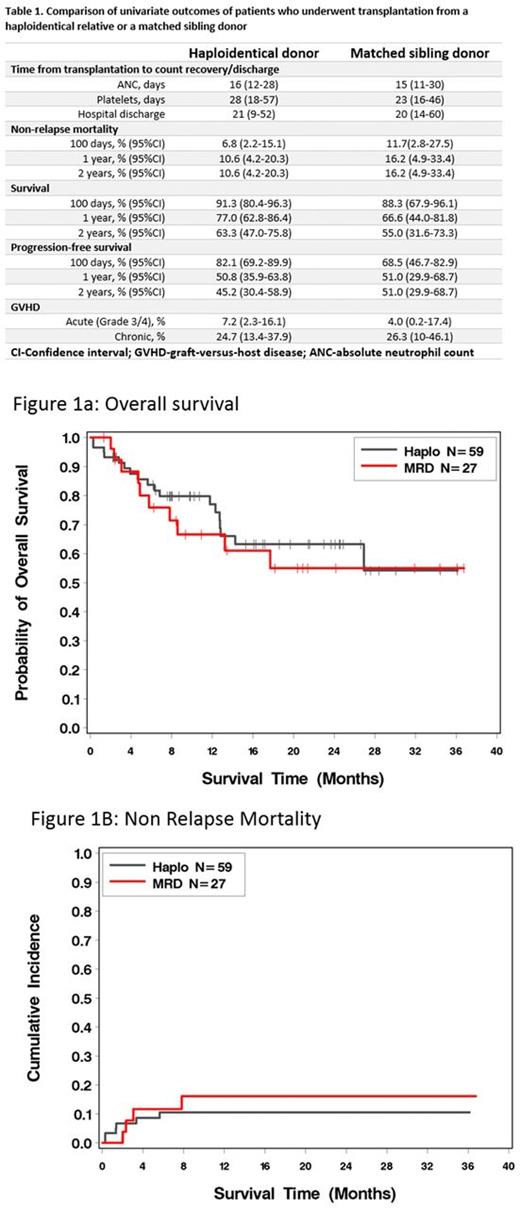Abstract
Background: Alternative donors permit the application of hematopoietic cell transplantation (HCT) in more than 70% of patients lacking HLA-matched sibling donors (MSDs). Alternative donor sources such as matched unrelated donors (MUDs) and umbilical cord blood (UCB) expand the donor pool for allogeneic transplants. However, these donor sources can be associated with higher complication rates and higher costs (Preussler JM et al, Biol Blood Marrow Transplant 2012). Post-transplant cyclophosphamide (PTCy) has facilitated the widespread use of haploidentical donors, and multiple studies report favorable outcomes using this approach. Comparisons of outcomes with this approach however are generally made to MSD or MUD cohorts in whom PTCy was not utilized, and cost comparisons are lacking.
Methods: From March, 2014 through May 2017, all patients considered for allogeneic HCT at Levine Cancer Institute underwent HLA-typing along with their siblings. If no suitable MSD was identified, typing of other family members was performed to identify the most appropriate haploidentical donor. Haploidentical relatives were utilized in patients lacking a suitable MSD. UCB and MUD transplants were not performed. Busulfan/Cy and fludarabine/Cy/TBI were used as myeloablative and non-myeloablative conditioning respectively. All patients received mobilized peripheral blood cells followed by PTCy, tacrolimus and mycophenolate mofetil as GVHD prophylaxis. Disease risk index (DRI) was used to risk stratify patients. This study was designed to compare the outcomes and cost of MSD and haploidentical related donor HCT. Kaplan-Meier method was used to estimate OS and PFS and the differences between MSD and haploidentical were evaluated by log-rank test. Cumulative incidence curves were used to estimate incidences of NRM, with relapse-related mortality as a competing risk, and incidences of acute and chronic GVHD with death from any cause as a competing risk. Group comparison of incidences were determined by Gray's test. Cox regression was used in the multivariate analysis to estimate hazard ratios and corresponding P-values were determined by Wald chi-square test. Differences in major complications between the 2 groups were analyzed using Fisher's exact test.
Results: We performed 59 haploidentical (48 for leukemia, 9 lymphoma and 2 multiple myeloma) and 27 MSD (18 for leukemia, 9 lymphoma) HCTs. The majority of patients received non-ablative conditioning (89.5%). Nine patients received myeloblative chemotherapy (5 in the haploidentical cohort and 4 in the MSD cohort). No significant differences in DRI, recipient age, ABO mismatch, recipient/donor gender were identified between the 2 groups. Donor age was lower in haploidentical (median 38; range 13-72 years), compared with the MSD group (median 56; range 29-73 years; P<0.001). The median follow-up was 17.2 months for the haploidentical group and 20.4 months for the MSD group. The incidences of non-relapse mortality (NRM; P=0.57), overall survival (OS; P=0.63), progression-free survival (PFS; P=0.90), Grades III-IV acute (P=0.56) and chronic GVHD (P=0.86) were similar between the groups (Table 1, figure 1). On multivariate analysis, higher DRI (HR 3.7; P<0.001), older donor age (HR 1.04 per year; P=0.005) and lower Karnofsky score (HR 2.08; P=0.03) were adverse predictors of PFS. Donor source (haploidentical vs. MSD HR 1.46; P=0.36), recipient age, ABO mismatch and donor/recipient gender match were not associated with PFS. No differences in the incidence of significant cardiac, pulmonary, renal, hepatic or GI toxicities were detected between the groups. Inpatient charges and those from the first 100 days following discharge were nearly identical; the median total charges were 0.29% lower in the haploidentical group compared to the MSD group.
Conclusion: This biologically assigned comparison of HCT using haploidentical relatives or MSDs suggests that in patients lacking MSDs, HCT using haploidentical donors yields similar outcomes and incurs similar costs. Validation of these results is warranted.
Trivedi: Pharmacyclics: Consultancy, Honoraria. Ghosh: Seattle Genetics: Consultancy, Honoraria, Research Funding; TG Therapeutics: Consultancy, Honoraria, Research Funding; Gilead: Consultancy, Honoraria, Speakers Bureau; Pharmacyclics: Consultancy, Honoraria, Research Funding, Speakers Bureau; Celgene: Consultancy, Honoraria, Research Funding, Speakers Bureau; AbbVie: Consultancy, Honoraria, Speakers Bureau; Jassen: Consultancy, Honoraria, Research Funding; Bristol Myers Squibb: Consultancy, Honoraria, Research Funding; Kite Pharma: Consultancy, Honoraria. Grunwald: ARIAD: Consultancy; Janssen: Research Funding; Cardinal Health: Consultancy; Alexion: Consultancy; Celgene: Consultancy; Pfizer: Consultancy; Genentech: Research Funding; Forma Therapeutics: Research Funding; Incyte: Consultancy, Research Funding; Amgen: Consultancy, Research Funding. Usmani: Millennium: Honoraria, Membership on an entity's Board of Directors or advisory committees, Speakers Bureau; Array BioPharma: Honoraria, Research Funding; Takeda: Consultancy, Honoraria, Research Funding, Speakers Bureau; Janssen: Honoraria, Membership on an entity's Board of Directors or advisory committees, Research Funding; Amgen: Consultancy, Honoraria, Speakers Bureau; Bristol-Myers Squibb: Honoraria, Research Funding; Skyline: Honoraria, Membership on an entity's Board of Directors or advisory committees; Pharmacyclics: Honoraria, Research Funding; Celgene: Consultancy, Honoraria, Membership on an entity's Board of Directors or advisory committees, Research Funding, Speakers Bureau; Onyx: Honoraria, Membership on an entity's Board of Directors or advisory committees, Research Funding, Speakers Bureau; Novartis: Speakers Bureau; Sanofi: Consultancy, Honoraria, Membership on an entity's Board of Directors or advisory committees, Research Funding. Voorhees: Novartis: Consultancy; Celgene: Consultancy, Speakers Bureau; Bristol-Myers Squibb: Consultancy; Janssen: Consultancy, Speakers Bureau; Oncopeptides: Consultancy; Takeda: Consultancy; Amgen: Speakers Bureau. Bhutani: Prothena Therapeutics: Research Funding; BMS: Speakers Bureau; Amgen: Speakers Bureau; Takeda Oncology: Speakers Bureau.
Author notes
Asterisk with author names denotes non-ASH members.


This feature is available to Subscribers Only
Sign In or Create an Account Close Modal